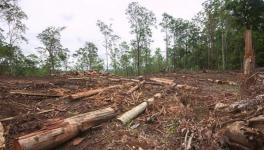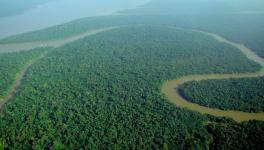Deforestation Increased by 10% in 2022 Despite Global Pledges

Image Courtesy: Wallpaper Flare
Last year witnessed the loss of the primary tropical rainforest equal to the size of Switzerland. According to Global Forest Watch (GFW), an independent organisation supported by the World Resources Institute.
The major onus is on Brazil, where Amazon deforestation was unabated. This was Jair Bolsonaro’s government’s last year, accounting for more than 40% of all losses. Bolsonaro’s environmental policies were criticised globally.
The GFW reported that deforestation in 2022 spiked to 10,000 sq mt (3,900 square miles) over what is needed to halt it entirely by 2030. The deforestation is nearly equal to a forest loss of a football pitch every five seconds. Worryingly, this is 10% more than the previous year. Overall, 41,000 sq mt (15,800 square miles) of tropical rainforests were lost in 2022, the GFW report stated.
Francis Seymour, a World Resource Institute official, said to Reuters, “2022 numbers are particularly disheartening. We had hoped by now to see a signal in the data that we were turning the corner on forest loss.”
Primary forests, as defined by the GFW, are not regrown or cleared recently. These mature and old forests play an essential role in protecting the climate, which is paramount in mitigating global warming and carbon sequestration because they absorb huge quantities of carbon dioxide. As per estimates, last year’s primary forest loss emitted nearly 2.7 gigatons of carbon dioxide. This amount of carbon dioxide is almost equal to India’s annual fossil fuel emission, the GFW report said.
The worrying part of the report is that all this happened when there was a global pledge signed by 145 countries at the COP26 last year to halt deforestation entirely by the end of this decade. Instead of a consistent decrease in deforestation, the opposite is happening.
After Brazil, the DRC (Democratic Republic of Congo) and Bolivia accounted for 13% and 9% of the primary forest loss, respectively. The Bolivian forest loss, according to experts, was mainly driven by commodity agriculture with the government’s support for agribusiness.
The report also had some positive news from Asia, particularly Indonesia and Malaysia. These two countries kept the forest loss under record low. The continuance of multilayer efforts to halt deforestation, caused by palm oil plantations, was a major factor. Indonesia has stricter policies like moratoriums on new licences in primary forests and peatlands, which helped curb deforestation.
Globally, vegetation and soil have consistently absorbed a significant portion of carbon dioxide (nearly 30%) since the 1960s. By now, the emission has increased by half and there is a growing necessity of halting deforestation.
GFW director Mikaela Weisse told Al Jazeera, “We are rapidly losing one of our most effective tools for combating climate change, protecting biodiversity and supporting the health and livelihoods of millions.”
Get the latest reports & analysis with people's perspective on Protests, movements & deep analytical videos, discussions of the current affairs in your Telegram app. Subscribe to NewsClick's Telegram channel & get Real-Time updates on stories, as they get published on our website.
























